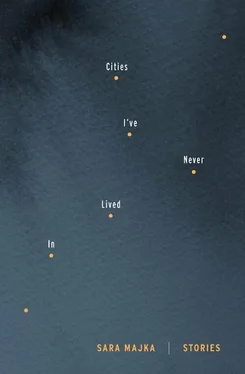When we went it was all four of us. Our parents left me with Stewart while they walked the beach. Stewart barely picked anything and then dropped the bucket I had filled for him. He found a way to fall and land on the berries. He wore a pair of canvas overalls, and berries burst against the fabric.
When the time came to go to the mainland to sell the dollhouse, my mother put me in a pink dress and a blue coat and oxford shoes with sharp laces. She pinched her mouth in whenever she did laces or buttons. She put a bonnet on me that had elastic under the chin.
On the boat, the two of them went inside to get drinks. Stewart and I stayed outside on deck chairs. We could see them through the glass. They looked elegant, as if they were strangers on a transatlantic boat ride. My mother wore a hat, long coat, and scarf. She leaned in toward my father. My father, who was tall and thin and young — they were both young back then — was in his Windbreaker and cotton pants. On the deck, the wind picked up and blew my brother’s hair. He was holding a bag of peanuts. He put them in his mouth in fistfuls and some missed and fell on the deck. He was wearing a seersucker suit that had shorts instead of pants, and the seagulls got so close they brushed his legs.
On the mainland, we went to my grandfather’s and my parents drove away to sell at antiques shows. They were gone for months. Maybe it was then that my father left — it was hard to know for sure. My grandfather was a gentle, benign presence. Not enough, surely, but when is there ever enough? He would putter around his farmhouse, hammering boards, inspecting the hose for leaks — the place where his neck sagged into his collar looking like a sucked-in paper bag. The shed where he grew African violets, keeping the leaves from burning by taping wax paper over the windows.
Afterward, in the library, he turned the pages of a book about France. Ah, he said, pointing to a picture of an orangerie, Maybe you’ll go there someday. Or maybe there, he said as he turned to another page. I think it was his way of saying what was happening to us — being left there — would only be one event in our life. That life would be many events; this was just one, and going to France to visit an orangerie could be another. He gripped my shoulder as if I were a loaf of bread, tried a different grip, then gave up altogether. Your father, he said, but then he didn’t continue.
There were flowers everywhere, an abundance of wild-flowers bowing under their own weight — tiger lilies and bell-flowers and yellow daisies, black-eyed susans. A peach tree with squirrels eating the fruit. Stewart chasing them, running in circles, flapping his arms.
Look, he said, motioning me over as if he had lost the power to do anything but frantically wave his arms, but also keeping me away, telling me, Don’t come. What is it? I said. He held the grass back with a stick. Inside was a burrow with slight, wiggling shapes. They were baby rabbits. They’re blind, he said. Stewart and I stood next to each other, staring in. We wanted to get closer, to touch them, but we were solemn, more solemn than we should have been as children. Such things can’t be helped. Our solemnity would only deepen as we grew older, so we often didn’t understand the people around us, their jokes and interest in the world. We felt disconnected unless we were in the presence of something beautiful, something still, something that called to us. And because of this we often treated people with a delicateness that wasn’t appropriate.
Even when my brother grew older and became a drinker, he kept that quality that drew people to him. His gentleness made the world feel softer, more open. He retold stories, boring stories about the bar where he worked, but the point was in the patterns of speech, the way they enveloped us.
I remember Stewart on his smoke break, perched on a stool near the Dumpster. He wore a thick canvas coat with sleeves that slid over his knuckles; his hands would peek out, one holding a cigarette, the other spidered over the pint glass. He drank by lifting his arched hand, sipping from the glass below — the movement so precise it was beautiful to look at.
We lived together in a run-down apartment in Portland. I had accepted a job as a tutor in Barcelona and was leaving at the end of the summer. I packed while the man I was dating watched a De Niro film, stretched out, taking up the sofa. While I was away I rarely wrote. I didn’t call. Months passed. I rented a room from a couple who spent nights twined on the sofa watching television. They didn’t notice when I walked by. This relaxed me, that they had no bearing on my life. I had no responsibility. There was nothing. Just days spent walking around the city, under those iron balconies that made of the city a layered cake. One day I reached out and touched the man I was tutoring. It didn’t surprise him, but it surprised me.
A friend called to say Stewart lost his job and then his apartment. I finally reached my brother at a friend’s place near Boston. Did you even get the Guernica T-shirt I sent? I asked. He said he couldn’t find most of his clothes after he’d gone to the Laundromat. He said, I keep looking for people who are wearing my clothes.
Not long after I moved back to Portland, Stewart visited, coming up from Boston. A cop pulled him over for driving an unregistered, uninsured car and he waited on the side of I-95 until I picked him up. What in the world were you thinking? I asked. It became difficult to drive because there was water in my eyes, and my nose was running. He said, Just pull over. I said, I’m on the highway. I wiped at my eyes with my palm. He said, Just pull over and I can drive, and I said, No, you can’t even do that. And he said, Yes. Yes, you’re right.
We sat on the side of the highway like we had sat a half hour earlier watching his car get loaded on the truck. We sat as if we had gotten good at it. How much is this going to cost you? I said. Two thousand. Jesus, Stewart, I said. You could just move back in, that room already smells, you might as well live in it. He said, You know you don’t really want that. I tried again later, several days later, but he didn’t make eye contact and said things like, That’s the way the dice rolls. He boarded the bus, a bag slung over his shoulder, one hand in his pocket. Inside, he crowded the window and gave what I took to be a surf’s-up sign. I went back to my apartment, still not used to how quiet it was when I was alone. He sent letters composed of words cut from a newspaper — they looked like the sort of thing that kidnappers sent — but it would be a while before I saw him again.
Thirty-Six Free Street in Jonesport, Maine, was a two-story brick building with a view of the harbor. It had an antiques shop downstairs and an apartment above it. When we — my mother, brother, and I — lived in Jonesport during my senior year of high school, a classmate of mine, Eli Cotter, lived in the apartment with his mother and sister. Eli’s mother, Gretchen, waitressed at Tall Barney’s, the one restaurant in town, and she was often gone with whichever of the local or seasonal men she was sleeping with at the time. There were rarely any adults there, and for that reason, and for others, the apartment was a strange place for me.
The apartment stood at the top of a narrow, musty staircase. A door — usually left unbolted — led into a foyer with a mirror and an end table where they kept the phone, along with dishes of change and stacks of mail. Much of this mail had the names of previous tenants. Whether it was mail left behind when the people moved out or mail that came after, I didn’t know. It looked old, though, parchmenty and bowed in the middle.
Gretchen’s spider plants clogged the bay window in the living room, and the three bedrooms stood off the hallway one after another, with a cramped bathroom at the end. Eli’s sister, Paige, often sulked through that hallway. Two years younger, she had none of Eli’s delicacy, his fineness. She was moody and overweight, with her shirt lifting to show fat bulging over the top of her jeans. The sister didn’t like me, neither of the women did, though the mother would sometimes sit with me. After my father left, my mother moved us frequently, and we had once lived in Bangor, near a place where Gretchen had friends, and she asked about it. Before that it had been another town in Maine, and she asked about that, too. She slumped on the sofa, her hands gripping her cigarette like bird claws. Once, I mentioned a town I had lived in, then corrected myself because I had listed the towns in the wrong order, then paused to wonder if I had gotten it right. As I floundered, she said, Poor girl, and not sympathetically. I asked her, Why, why poor girl? But she didn’t answer.
Читать дальше












